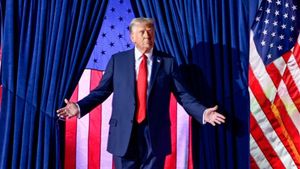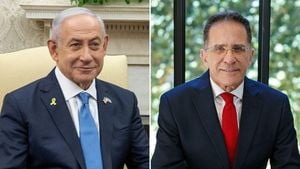North Korea's alliance with Russia has recently taken on new dimensions, stirring up international concern and altering the dynamics of military engagements on various fronts. The latest reports reveal the deployment of North Korean troops to the war-torn zones of Ukraine, where they are allegedly engaging directly with Ukrainian forces. This cooperation poses significant ramifications not just for the immediate conflict but for geopolitical relations across the globe.
On November 14, 2024, South Korea's government confirmed the presence of North Korean troops fighting alongside Russian forces, particularly noting their involvement in the Kursk region, which borders Ukraine. At this time, officials from South Korea’s National Intelligence Service announced the identification of North Korean soldiers already participating in frontline operations. This action has been categorized by the South Korean government as another unjustifiable act by the North, as they accused its leadership of sending soldiers to their potential demise for Russia’s war efforts.
Adding to this backdrop, North Korean state media reported recently on leader Kim Jong-un’s ratification of a mutual defense treaty with Russia, first signed during President Vladimir Putin's visit to Pyongyang earlier this year. The treaty, as highlighted by their state-run news agency, ensures mutual military support between the two nations should either face armed aggression.
This cooperation has become particularly concerning to Western nations, as it marks the first time North Korean soldiers are directly reported to be engaged on Ukrainian soil. Officials estimate around 10,000 troops may have been deployed, and their active involvement signifies a troubling escalation within this volatile scenario.
Ukrainian President Volodymyr Zelensky weighed in on the situation, stating last week, “The involvement of North Korean forces on our territory indicates we are entering a new phase of global instability.” Such sentiments reflect the heightened anxiety surrounding the scope of this alliance, as it brings new players to what has become one of the most dynamic and deadly theatres of conflict.
According to various intelligence assessments — including insights from the United States and South Korea — North Korea has reportedly provided significant military supplies and resources to Russia, including artillery shells and missiles, directly impacting the Russian defense capabilities amid the Ukraine war. These actions comprise part of what officials have characterized as increasing military cooperation destined to destabilize existing international peace agreements.
The defenses of various nations are now under review as questions arise about how to handle North Korea's new military commitments to Russia. South Korea's government has stated it will implement “effective and phased measures” to respond to the growing concern over North Korean troop deployments, firmly insisting on maintaining security diligence amid rising tensions. This approach speaks to a more extensive consolidation of military strategies from the North, particularly as they relate to Russia's operations.
Russian lawmakers also took steps to solidify their relationship with North Korea, approving the defense treaty, which entails provisions for military assistance to be rendered immediately upon request by either nation under threat. Such commitments only reinforce the belief among South Korea and its allies of the deepening military ties between Pyongyang and Moscow.
Opposition from the global community is growing increasingly visible as the G7 nations recently denounced this military cooperation, signaling their unease with developments between North Korea and Russia. They expressed specific worry over the potential training opportunities North Korean forces might receive concerning ballistic missiles and other advanced weapon systems, breaching the regulations established via UN Security Council resolutions. Meanwhile, both North Korea and Russia continue to keep their public informed about their partnership through high-profile remarks from leaders like Foreign Minister Choe Son Hui, who reiterated their commitment to supporting Russia until “the day of victory.”
With the dynamics shifting rapidly, the long-standing narratives around North Korea’s human rights violations and its exceedingly secretive regime are set against the backdrop of significant global military realignments. Such developments are significant as both countries continue to look for avenues of mutual benefits through this newly formed alliance. This not only entails military engagements but also encompasses trade, information sharing, and more comprehensive forms of cooperation.
The deployment and activities of North Korean soldiers north of Ukraine raises many questions about the future of regional stability. The North's involvement could trigger swift retaliation from other nations, particularly if they intensify their engagements. Past experiences suggest any escalation could result in heightened military responses from Ukraine's allies, leading to significant geopolitical fragmentation.
What remains uncertain is how neighboring countries, particularly Japan and South Korea, will impact the situation going forward. Each government must weigh their potential responses not only to protect their security interests but also to uphold commitments to allies amid seemingly unpredictable escalations.
International observers assert North Korea’s endorsement of the defense treaty and subsequent troop deployments indicate more than mere support for Russia – it’s about establishing North Korea as both militarily and politically relevant on the global stage. The alliances formed during these precarious times may lay the groundwork for future geopolitical shifts, pointing toward new patterns of collaboration among nations once deemed oppositional.
Emerging from this alliance is the prospect of increased isolation for nations like North Korea, as their partnership with Russia could almost paradoxically lead to heightened scrutiny from the international community, bringing harsh sanctions, and faltering relations with Western and allied nations. Nevertheless, the ambiance surrounding these decisions symbolizes the changing tides of military engagements, one where traditionally unfriendly nations now find common ground wound tightly by the threads of conflict.
It's safe to say, the war front is not merely geographical anymore; it's becoming a reflection of shifting allegiances and military strategies. Only time will tell how these alliances will influence broader global stability, but one thing is clear — the taut web of geopolitics is increasingly complex and riddled with potential flashpoints.



